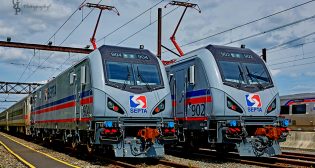
Toronto’s transit travails take a tepid turn
Written by William C. Vantuono, Editor-in-ChiefIn the wake of Bombardier Transportation’s ongoing problems with light rail vehicles it’s building for various Ontario LRT projects, the purported combination of the railway businesses of Siemens and Bombardier appears to have taken on an interesting twist. This folllows the filing of an official protest letter by Siemens Canada with Ontario’s Transportation Minister over Metrolinx’s awarding of a single-source LRV contract to Alstom.
In a May 24 letter to Ontario Transportation Minister Steven Del Duca that has not been released publicly but was obtained by the Toronto Star, Siemens Canada CEO Robert Hardt said Metrolinx’s decision to issue a C$528 million sole-source contract to Alstom for 61 low-floor Citadis Spirit LRVs violates government procurement policies as well as international trade agreements. Hardt said Siemens is “extremely disappointed” with the provincial transit agency’s decision in May to purchase the LRVs from Alstom without entertaining competitive bids. Metrolinx’s move “violates the government’s own procurement directive” and “is inconsistent with public procurement provisions” contained in CETA (Canada-European Union Comprehensive Economic and Trade Agreement), signed in October 2016 by Canadian Prime Minister Justin Trudeau.
“This decision effectively eliminates Siemens from competition for future [LRV] procurement in Ontario, thus causing us irreparable harm,” Hardt said. “We are, of course, exploring all options available to us to respond to this decision.”
Metrolinx says it awarded the contract to Alstom as an emergency measure and is well within its rights. Metrolinx spokesperson Anne Marie Aikins told the Star that the Alstom deal had to be expedited because delays to Bombardier’s contract for Flexity LRVs for the under-construction Eglinton Crosstown and Finch West LRTs were jeopardizing the opening of both systems, which are scheduled to enter service in 2021. Eglinton is to receive 44 LRVs, Finch 17. Should Bombardier make good on the Eglinton order, those cars would be deployed to the planned Mississauga-Hurontario LRT.
“The purchase of Alstom vehicles is a contingency plan to address the emergency created by Bombardier’s failure to perform and deliver,” Aikins said. “Single-sourcing in this type of situation is aligned with our procurement policies.”
When Del Duca announced the Alstom deal on May 12, he said it was a backup plan should Metrolinx’s problematic, C$770 million contract with Bombardier fall through. Metrolinx is currently in dispute resolution with Bombardier over that contract, which is for 182 cars. In April, an Ontario Superior Court ruled that Metrolinx could not cancel its contract with Bombardier, but in light of recent developments, that could change.
Metrolinx’s procurement policy states that the agency is required to issue competitive public tenders for goods valued over $25,000 to the lowest bidder. If a project is complex, Metrolinx is supposed to publicly advertise an RFP. Metrolinx did neither for the Alstom contract, saying that its procurement policy provides exceptions for “emergency purchases,” defined as situations when an “immediate purchase … is essential to prevent serious delays (or) excessive costs.”
 Alstom is building Citadis Spirit LRVs for Ottawa’s Confederation Line (pictured) and as such has established a Canadian supply chain. Minister Del Duca has said Alstom would open an assembly plant in the GTA (Greater Toronto Area) to build the Metrolinx cars, adding that late-delivery penalties for Alstom “are stronger” than they are for Bombardier. The agency has said it is confident that Alstom will be able to meet the Bombardier contract’s 25% domestic content requirements as well as Ontario’s accessibility standards.
Alstom is building Citadis Spirit LRVs for Ottawa’s Confederation Line (pictured) and as such has established a Canadian supply chain. Minister Del Duca has said Alstom would open an assembly plant in the GTA (Greater Toronto Area) to build the Metrolinx cars, adding that late-delivery penalties for Alstom “are stronger” than they are for Bombardier. The agency has said it is confident that Alstom will be able to meet the Bombardier contract’s 25% domestic content requirements as well as Ontario’s accessibility standards.
Yet, substituting Alstom LRVs for Bombardier cars would not be problem-free. According to the Star, “the Alstom purchase might also require modifications to the Crosstown infrastructure, which is already under construction and was designed with Bombardier vehicles in mind. . . . [A] maintenance and storage facility that is already partially built would likely have to be modified.”
Bombardier’s LRV troubles aren’t confined to Metrolinx. The Toronto Transit Commission, which ordered 204 similar Flexity Outlook LRVs from Bombardier (pictured) for its 10-line streetcar network, is also involved in legal proceedings with the carbuilder and has threatened to cancel the contract. TTC, for the better part of two years, has been dealing with delayed deliveries caused by assembly problems, such as faulty electrical connectors and Concarril (Mexico)-fabricated carbodies that did not fit properly to subframes during final assembly at Bombardier’s Thunder Bay, Ont., plant (which had earlier suffered a unionized-workers’ strike). Fewer than 50 of the 204 LRVs have entered service, and a new, purpose-built maintenance and storage facility remains largely empty. Meanwhile, the TTC’s aging fleet of 248 Canadian Light Rail Vehicles and Articulated Light Rail Vehicles are nearing the end of their useful life.
Given all these complex problems and legal wrangling, why would Siemens want to get involved in the entire mess? Observers say that Siemens, should the intended combination of its railway business with that of Bombardier occur, would gain entrée into a lucrative and growing Ontario rail transit vehicle market (Siemens has supplied LRVs to Calgary Transit and Edmonton Transit). However, preliminary information suggests that the Bombardier part of the new organization would control the rolling stock business.



